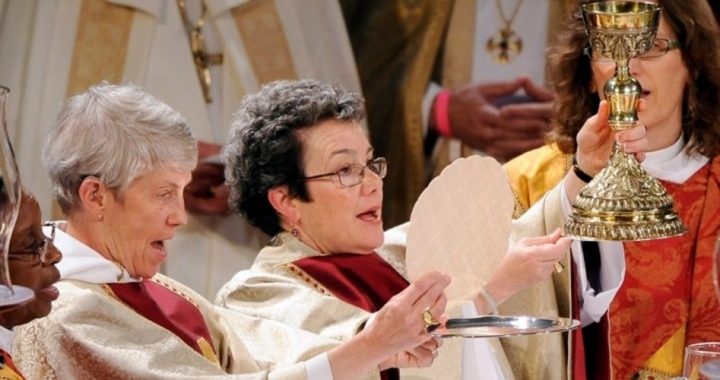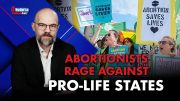
Days after the Presbyterian Church (PCUSA) voted to maintain its definition of marriage as between a man and a woman, America’s main Episcopal denomination pulled out all the stops on homosexual behavior, approving an official prayer service for blessing same-sex partnerships and clearing the way for ordaining transgendered individuals for ministry.
On July 9 at the Episcopal Church’s General Convention in Indianapolis, the denomination’s House of Bishops voted 111-41 to authorize a trial rite for same-sex unions to be observed over the next three years, reported the Associated Press. Passage of the measure by the bishops was followed the next day by a 171-50 vote of approval by the denomination’s House of Deputies, which means that the provisional “Witnessing and Blessing of a Lifelong Covenant” will officially go into effect in December.
The change was inevitable, observers noted. Three years ago, the denomination voted to allow priests to bless homosexual partnerships if their bishops gave them permission, and while the present provisional measure still allows bishops who do not approve of homosexual “marriage” to prohibit the liturgy, it is just a matter of time before such protests are overridden by the tide of pressure from homosexual activists.
Mary Tolbert, director of the Center for Lesbian and Gay Studies in Religion and Ministry at the Pacific School of Religion, told the New York Times that the approval “is significant because it’s saying, ‘This is around to stay — this is not a passing fad.’ It’s making a statement about the continued presence of gay and lesbian people among the congregations of the Episcopal Church, and that their lives need to be marked by liturgy as well.”
The Episcopal Church is not the first denomination to allow bishops to “bless” same-sex partnerships. In 2005, another mainline denomination, the United Church of Christ (UCC), voted to allow such ceremonies. The UCC also allows the ordination of homosexual clergy.
The Rev. Susan Russell, an Episcopal minister and outspoken proponent of homosexual rights, told the New York Times, “I believe the Episcopal Church will continue to evolve on the issue of marriage equality and look forward to joining our U.C.C. brothers and sisters in being a headlight instead of taillight on marriage equality.”
On the same day the Episcopal Church approved the blessings over homosexual relationships, “the full convention approved new anti-discrimination language for transgendered clergy candidates and church members,” reported the AP. The term “transgender” refers to individuals who identify with, or somehow feel they are a member of, the opposite sex. The AP noted that some Episcopal dioceses “already ordain transgendered people or elect them to positions of parish leadership. However, advocates for the amendment argued they needed an explicit statement of acceptance as the churchwide policy.”
One such minister to which the new ruling will apply is the Rev. Carla Robinson, Episcopal vicar of All Saints Church in Seattle. Robinson, who apparently is biologically a male but dresses and behaves as a female, explained that the backing of bishops and church members in his area helped to get him ordained, and other “transgendered” individuals should have the same opportunity. “I stand here as a priest today because my diocese specifically said that my gender identity and expression didn’t disqualify me from the discernment process,” Robinson said as he lobbied the convention in favor of the proposal. “I ask that as a church we do the same for my trans sisters and brothers.”
The Rev. Susan Russell, a homosexual activist from Los Angeles, applauded the resolution’s approval, telling the Christian Post that it would bring her denomination “another step closer to making all the sacraments available to all the baptized.” She added that the “courageous witness of our transgender brothers and sisters has been an extraordinary gift to the church as we continue to grow in understanding and appreciation of the diversity of God’s beloved human family.”
Other ministers, however, pointed out that the denomination’s acceptance of homosexual behavior is at odds with biblical Christianity. “We are entering into a time of individualized eros,” said Bishop Mark Lawrence of the Diocese of South Carolina, “The freedom of every individual to self-define every aspect of who they are in such a way that we no longer have any kinds of norms. We are entering into the chaos of individuality. It’s an idol that will break us.”
Deputies from the South Carolina diocese issued a statement saying they were grieved that the “General Convention has further departed from these values and adopted a resolution to permit pastoral license to violate the existing canons on marriage. We believe this decision will seriously wound the Church.”
The Rev. Canon Dr. Kendall Harmon, an Episcopal theologian with the South Carolina diocese, added that the denomination’s actions in approving the blessing of same-sex partnerships “is unbiblical, unchristian, un-Anglican, and unseemly. By making this decision, the Episcopal Church moves further away from Jesus Christ and his teaching.”
Jeff Walton of the Institute on Religion & Democracy told OneNewsNow.com that the denomination’s latest actions are a recipe for self-destruction. As for the ordination of “transgendered” individuals, he said that it means “if there is a person who is suffering, for example, gender-identity disorder, they could not be denied access to ordination as clergy in the Episcopal Church simply based upon those grounds. So, it’s a pretty big move by the Episcopal Church to basically affirm transgenderism.”
As for blessing homosexual partnerships, “This is technically not marriage. That word isn’t used, but it goes pretty much all the way up to that,” explains Walton. “You have a rite in which there is an exchange of vows, and it essentially mirrors the marriage rite of the Episcopal Church, with only a few alterations.”
In 2003, the Episcopal Church made history by being the first denomination to elect an openly homosexual bishop when the Rev. Eugene Robinson was chosen to lead the denomination’s New Hampshire diocese. This caused a major split in the Episcopal Church, which in the last decade has lost around 16 percent of its membership, which now stands at less than two million.
The denomination’s move to embrace what many consider unscriptural behavior has also drawn the censure of conservative leaders within the global Anglican Communion, a network of national churches with an estimated 80 million members.
The Anglican Church in North America, a conservative denomination formed of members and clergy who left the mainline Episcopal Church over its liberal leanings, issued a statement saying, “It is unfortunate that the Episcopal Church continues to stray from the path of clear Biblical teaching. We are grieved when any part of the Church embraces doctrines and practices that are contrary to the Word of God.” The group added, however, “We remain hopeful that our brothers and sisters in the Episcopal Church will return to the clear teaching of Holy Scripture shared by most of the Anglican Communion and the Church throughout the world.”
Photo of openly gay Episcopal bishop Mary Glasspool, left, at a consecration service: AP Images



